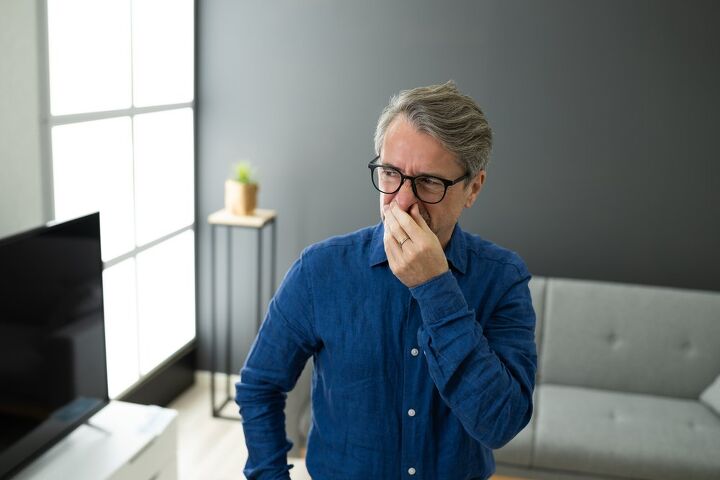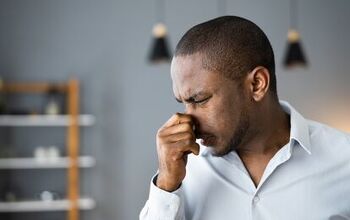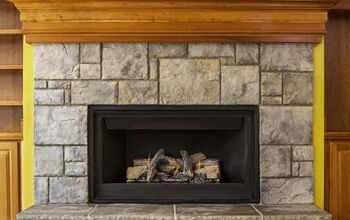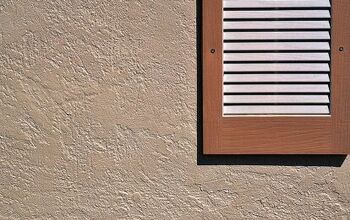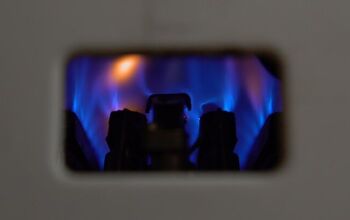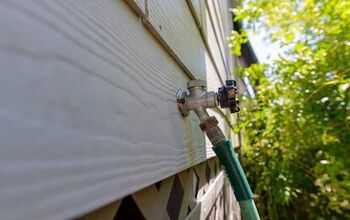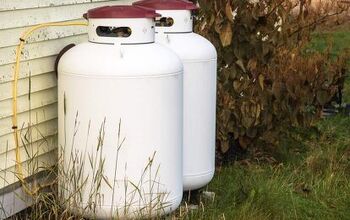House Smells Like Paint Thinner? (Possible Causes and Fixes)

Smelling paint thinner in your home is never a pleasant thing, but unfortunately, it’s a common after-effect of painting. However, if you haven’t painted or remodeled recently, it can be unnerving to smell paint thinner in your home. No matter what the reason, you understandably want to deduce the odor’s source and get rid of it.
The most common reason for smelling paint thinner in your house is a recent paint job or remodel. However, if you haven’t picked up a paintbrush recently, a faulty A/C can also cause a paint thinner smell. To rid your house of paint thinner odors, proper ventilation, baking soda, activated charcoal, and even water can help.
Additionally, if the source of the smell is your air conditioner, you’ll also want to have it inspected ASAP. Another helpful way to reduce lingering odors from painting projects is to use low VOC paints or water-based paints. But, if you find yourself in a house that smells like paint thinner, there are several things you can do.
Do You Need Home Inspection Services?
Get free, zero-commitment quotes from pro contractors near you.

What Is the Most Common Reason Your House Smells Like Paint Thinner?
Most likely, if your house smells like paint thinner, you’ve probably been painting recently. The smell of paint thinner is an all too common result of painting.
Even following many remodeling jobs you can smell something similar to paint thinner due to the many chemicals in products. For example, the resins and other components in things like new flooring can also carry the familiar scent.
When you paint, many paints contain paint thinner to make them easier to apply. You also likely use actual paint thinner to clean up paint, strip paint, clean supplies, and other project-related tasks.
Paints also contain VOCs, or volatile organic compounds, that add to the odor. These VOCs are especially overpowering, evaporating quickly and dispersing through the air. Plus, when exposed to them, they can lead to skin, nose, and eye irritation.
While these reasons are the most likely cause for smelling paint thinner, what if you haven’t painted? What if you haven’t remodeled recently? If you’re smelling paint thinner in your house, it can certainly raise a red flag.
Why Does My House Smell Like Paint Thinner If I Haven’t Painted?
If you’re smelling paint thinner in your home, but haven’t painted, check out your HVAC system. Air conditioning units use various chemicals and fluids that can leak. Also, various other issues with your unit can lead to odors that resemble paint thinner.
If you suspect this could be the case, see if the smell gets stronger as you get near your unit. This would pretty much be a dead giveaway. Also, if you’re experiencing any other issues with your A/C, then it could be to blame for the smell.
It’s important to have your A/C cleaned and serviced at least once a year. Your entire HVAC system should be serviced twice a year, before summer and prior to winter.
If your A/C starts to stink or has any other issues, call a professional immediately to address the problems. Ignoring issues can lead to problems getting worse, ultimately reducing the lifespan of your HVAC system.
How to Get Rid of Paint Thinner Smells in Your House
Now that you know why your house smells like paint thinner, you naturally want to know how to fix it. Of course, if the problem lies with your A/C unit, make sure to get it repaired or replaced pronto. But whether painting or not, you want to get the odor out of your house ASAP.
Use these steps to get the paint thinner smell out of your house.
Step One: Increase Ventilation
Anytime you’re painting or handling chemicals, you should ensure the area is adequately ventilated. However, even when the job is done, it’s essential to allow proper airflow through your home.
This isn’t just for odors, but it’s also for your safety. Staying in a poorly ventilated area with fumes can lead to health problems. Therefore, you need to help the bad stuff in the air get out faster.
So, if your house smells like paint thinner, start opening up all of the windows and doors and allow for cross-ventilation. Also, turn on all your fans, exhaust fans, and use portable fans in rooms with no windows or fans.
Step Two: Clean Up Immediately and Correctly
Even with excellent ventilation, if you just leave your painting supplies in the room, it keeps creating new fumes. Part of any professional-like paint job is cleaning up the mess afterward. But you need to do so safely, both for yourself and the environment.
So, ensure you clean all of the brushes, sponges, rollers, and everything else that’s touched paint thinner, paint, etc. Also, fully seal all containers, carefully pounding down the lids with a rubber mallet if necessary. (Cover them with a rag before you do to avoid splashing.)
If you have rags, empty containers, etc., place them in a sealed bag before putting them in the trash. Do not throw any partially empty paint or paint thinner in the regular garbage.
You need to dispose of this at the proper facilities. Once you’ve cleaned and bagged everything, get the trash out of your house.
Step Three: Neutralize The Odor
It’s also a good idea to eradicate the odor by neutralizing it. In other words, don’t just mask it, but instead, knock out the source. There are several household items and other simple things you can do to neutralize paint-thinner smells.
- Sprinkle baking soda around the room and let it sit overnight. Then, vacuum it up the next day.
- Place activated charcoal powder in bowls and set them around the rooms you painted. Leave the bowls out overnight.
- Fill bowls with white vinegar and place them around the room overnight.
- You can also use simple, plain water. Fill several bowls with water and place them around the room overnight.
Step Four: Add Some Pleasant Aromas
Again, proper ventilation and neutralizing the odor are necessary. Still, you can give your nose some extra relief. While you’re doing the other steps, you can also cover up the smell with some more pleasant scents.
You can use typical products like air fresheners, diffusers, or scented candles. You can also bake cookies or similar items or cook a meal with chopped garlic and onions.
Try These Tips Too
Is Paint Thinner Dangerous?
Painting is one of the most go-to DIY projects because it’s a cost-effective, simple way to make a significant change. But, because of these qualities, it can also come across as 100% safe. However, it’s essential to protect yourself while handling any type of paint, chemicals, and so forth.
Paint thinner can cause several health issues, both short-term and long-term. If you undergo frequent exposure to paint thinner, you can end up with even more severe problems.
Health issues range from headaches, nausea, and irritation of the eyes, nose, and throat to chronic respiratory issues. Paint thinner also poses a danger to pets and children who can ingest it accidentally.
It’s also been used by some people, especially teens, as an inhalant, causing health consequences and death. In many cases, with frequent use in this way, it can become as addictive as something like cocaine.
Do You Need Home Inspection Services?
Get free, zero-commitment quotes from pro contractors near you.

Related Questions
Are mineral spirits and paint thinner the same thing?
No, but they are often used for the same purposes. Mineral spirits are a distilled, refined petroleum used to thin oil-based paints and clean brushes, etc. Mineral spirits are typically less toxic and less smelly than paint thinner. You can even get odorless mineral spirits. However, paint thinner tends to be less expensive, and turpentine-based paint thinner can even clean dried paint. Also, mineral spirits won’t work with latex paint.
Why does my washing machine smell like paint thinner?
You might notice that a paint thinner smell is emanating from your washing machine. If you’ve painted recently and washed clothes in the machine, paint thinner on your clothes can leave behind odors. Washing machines tend to hang onto various smells, even though you’re constantly running detergent and water through them. Many machines feature a cleaning cycle that you can run with a washing machine cleaner. These are typically tablets or pods you run through the machine. However, for an overpowering odor, use white vinegar and baking soda to scrub the interior of the machine. Simply dampen a rag with vinegar and sprinkle baking soda on it. Wipe down the machine’s tub, door, and underside of the lid.Then, wipe off the baking soda with a damp rag and pour ½ a cup of bleach into the bleach dispenser. Run a cycle of hot water, and when it’s done, leave the lid open and let the machine air out.
What are safe-handling practices for paint thinner?
When using paint thinner, wear a mask, gloves, and safety goggles. Store paint thinner in a safe location, out of children’s reach, and away from potential fire sources. Also, the place you store your paint thinner should be well-ventilated.Never pour paint thinner down a drain as it can contaminate the groundwater. You must dispose of paint thinner according to your local environmental authority agency. Most likely, there’s a special facility to bring paint thinner, paint, and other chemicals too for safe disposal.

Stacy Randall is a wife, mother, and freelance writer from NOLA that has always had a love for DIY projects, home organization, and making spaces beautiful. Together with her husband, she has been spending the last several years lovingly renovating her grandparent's former home, making it their own and learning a lot about life along the way.
More by Stacy Randall



